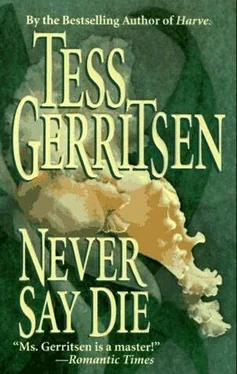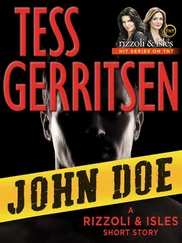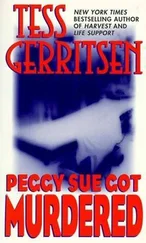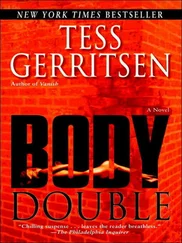Tess Gerritsen - Never say die
Здесь есть возможность читать онлайн «Tess Gerritsen - Never say die» — ознакомительный отрывок электронной книги совершенно бесплатно, а после прочтения отрывка купить полную версию. В некоторых случаях можно слушать аудио, скачать через торрент в формате fb2 и присутствует краткое содержание. Жанр: Триллер, на английском языке. Описание произведения, (предисловие) а так же отзывы посетителей доступны на портале библиотеки ЛибКат.
- Название:Never say die
- Автор:
- Жанр:
- Год:неизвестен
- ISBN:нет данных
- Рейтинг книги:4 / 5. Голосов: 1
-
Избранное:Добавить в избранное
- Отзывы:
-
Ваша оценка:
- 80
- 1
- 2
- 3
- 4
- 5
Never say die: краткое содержание, описание и аннотация
Предлагаем к чтению аннотацию, описание, краткое содержание или предисловие (зависит от того, что написал сам автор книги «Never say die»). Если вы не нашли необходимую информацию о книге — напишите в комментариях, мы постараемся отыскать её.
Never say die — читать онлайн ознакомительный отрывок
Ниже представлен текст книги, разбитый по страницам. Система сохранения места последней прочитанной страницы, позволяет с удобством читать онлайн бесплатно книгу «Never say die», без необходимости каждый раз заново искать на чём Вы остановились. Поставьте закладку, и сможете в любой момент перейти на страницу, на которой закончили чтение.
Интервал:
Закладка:
She pulled away, fighting to catch her breath.
"Well!" said Guy, grinning up at her. "Miss Willy Maitland, Iam surprised."
She sat up, nervously shoving her hair back into place. "I never meant to do that."
"Yes, you did."
"It was a stupid thing to do."
"Then why did you?"
"It was…" She looked him in the eye. "Pure instinct."
He laughed. In fact, he fell backward laughing, rolling around on the sacks of rice. The truck hit a pothole, bouncing her up and down so hard, she collapsed onto the floor beside him.
And still he was laughing.
"You're a crazy man," she said.
He threw an arm around her neck and pulled her warmly against him. "Only about you."
In a black limousine with tinted windows, Siang sat gripping the steering wheel and cursing the wretched highway-or what this country called a highway. He had never understood why communism and decent roads had to be mutually exclusive. And then there was the traffic, added to the annoyance of that government vehicle inspection. Ithad given him a moment's apprehension, the sight of the armed soldiers standing at the roadside. But it took only a few smooth words from the man in the back seat, the wave of a Soviet diplomatic passport, and they were allowed to move on without incident.
They continued west; a road sign confirmed it was the highway to Dien Bien Phu. A strange omen, Siang thought, that they should be headed for the town where the French had met defeat, where East had triumphed over West. Centuries before, an Asian scribe had written a prophetic statement.
To the south lie the mountains,
The land of the Viets.
He who marches against them
is surely doomed to failure.
Siang glanced in the rearview mirror, at the man in the back seat. He wouldn't be thinking in terms of East versus West. He cared nothing about nations or motherlands or patriotism. Real power, he'd once told Siang, lay in the hands of individuals, special people who knew how to use it, to keep it, and he was going to keep it.
Siang had no doubt he would.
He remembered the day they'd first met in Happy Valley, at an American base the GIs had whimsically dubbed "the Golf Course." It was 1967. Siang had a different name then. He was a slender boy of thirteen, barefoot, scratching out a hungry existence among all the other orphans. When he'd first seen the American, his initial impression was of hugeness. An enormous fleshy face, alarmingly red in the heat; boots made for a giant; hands that looked strong enough to snap a child's arm in two. The day was hot, and Siang was selling soft drinks. The man bought a Coca Cola, drank it down in a few gulps and handed the empty bottle back. As Siang took it, he felt the man's gaze studying him, measuring him. Then the man walked away.
The next day, and every day for a week, the American emerged from the GI compound to buy a Coca Cola. Though a dozen other children clamored for his business, each waving soft drinks, the man bought only from Siang.
At the end of the week, the man presented Siang with a brand-new shirt, three tins of corned beef and an astonishing amount of cash. He said he was leaving the valley early the next morning, and he asked the boy to hire the prettiest girl he could find and bring her to him for the night.
It was only a test, as Siang found out later. He passed it. In fact, the American seemed surprised when Siang appeared at the compound gate that evening with an extraordinarily beautiful girl. Obviously, the man had expected Siang to take the money and vanish.
To Siang's astonishment, the man sent the girl away without even touching her. Instead, he asked the boy to stay-not as a lover, as Siang at first feared, but as an assistant. "I need someone I can trust," the man said. "Someone I can train…"
Even now, after all these years, Siang still felt that young boy's sense of awe whenever he looked at the American. He glanced at the rearview mirror, at the face that had changed so little since that day they'd met in Happy Valley. The cheeks might be thicker and ruddier, but the eyes were the same, sharp and all-knowing. Just like the mind. Those eyes almost frightened him.
Siang turned his attention back to the road. The man in the back seat was humming a tune: "Yankee Doodle." A whimsical choice, considering the Soviet passport he was carrying. Siang smiled at the irony of it all.
Nothing about the man was ever quite what it seemed.
Chapter Eleven
It was late in the day when the truck at last pulled to a halt. Willy, half-asleep among the rice sacks, rolled drowsily onto her back and struggled to clear her head. The signals her body was sending gave new meaning to the word misery. Every muscle ached; every bone felt shattered. The truck engine cut off. In the new silence, mosquitoes buzzed in the gloom, a gloom so thick she could scarcely breathe.
"Are you awake?" came a whisper. Guy's face, gleaming with sweat, appeared above her.
"What time is it?"
"Late afternoon. Five or so. My watch stopped."
She sat up and her head swam in the heat. "Where are we?"
"Can't be sure. Near the border, I'd guess…" Guy stiffened as footsteps tramped toward them. Men's voices, speaking Vietnamese, moved closer.
The canvas flap was thrown open. Against the sudden glare of daylight, the faces of the two men staring in were black and featureless.
One of the men gestured for them to climb out. "You follow," he ordered. "Say nothing."
Willy at once scrambled out and dropped onto the spongy jungle floor. Guy followed her. They swayed for a moment, blinking dazedly, gulping in their first fresh air in hours. Chips of afternoon sunlight dappled the ground at their feet. In the branches above, an invisible bird screeched out a warning.
The Vietnamese man motioned to them to move. They had just started into the woods when an engine roared to life. Willy turned in alarm to see the truck rattle away without them. She glanced at Guy and saw in his eyes the same thought that had crossed her mind, There's no turning back now.
"No stop. Go, go!" said the Vietnamese.
They moved on into the forest.
The man obviously knew where he was going. Without a trail to guide him, he led them through a tangle of vines and trees to an isolated hut. A tattered U.S. Army blanket hung over the doorway. Inside, straw matting covered the earthen floor and a mosquito net, filmy as lace, draped a sleeping pallet. On a low table was set a modest meal of bananas, cracked coconuts and cold tea.
"You wait here," said the man. "Long time, maybe."
'' Who are we waiting for? " asked Guy.
The man didn't answer; perhaps he didn't understand the question. He turned and, like a ghost, slipped into the forest.
For a long time, Willy and Guy lingered in the doorway, waiting, listening to the whispers of the jungle. They heard only the clattering of palms in the wind, the lonely cry of a bird.
How long would they wait? Willy wondered. Hours? Days? She stared up through the dense canopy at the last sunlight sparkling on the wet leaves. It would be dark soon. "I'm hungry," she said, and she turned back into the gloom of the hut.
Together they devoured every banana, gnawed every sliver of coconut from its husk, drank down every drop of tea. In all her life, Willy had never tasted any meal quite so splendid! At last, their stomachs full, their legs trembling with exhaustion, they crawled under the mosquito netting and, side by side, they fell asleep.
At dusk, it began to rain. It was a glorious downpour, monsoonlike in its ferocity, but it brought no relief from the heat. Willy, awake in the darkness, lay with her clothes steeped in sweat. In the shadows above, the mosquito net billowed and fell like a hovering ghost.
Читать дальшеИнтервал:
Закладка:
Похожие книги на «Never say die»
Представляем Вашему вниманию похожие книги на «Never say die» списком для выбора. Мы отобрали схожую по названию и смыслу литературу в надежде предоставить читателям больше вариантов отыскать новые, интересные, ещё непрочитанные произведения.
Обсуждение, отзывы о книге «Never say die» и просто собственные мнения читателей. Оставьте ваши комментарии, напишите, что Вы думаете о произведении, его смысле или главных героях. Укажите что конкретно понравилось, а что нет, и почему Вы так считаете.











